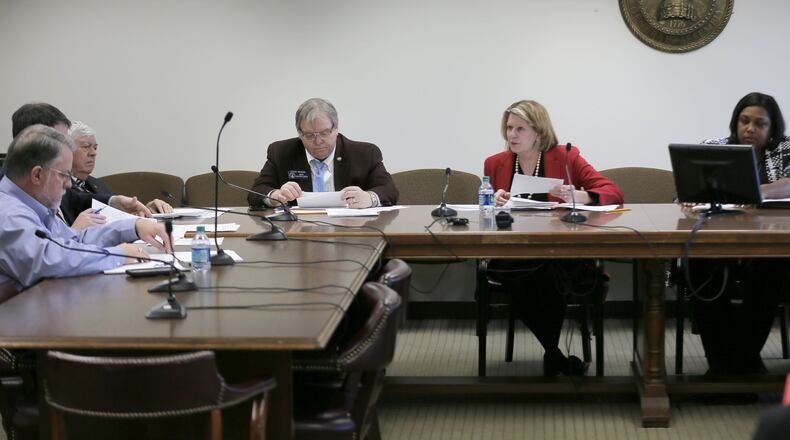Georgia legislators are considering sexual harassment rules that prohibit mistreatment of lobbyists, mandate training for elected officials and require anyone who witnesses sexual harassment to report it.
Lawmakers on a sexual harassment subcommittee — created by House Speaker David Ralston and Lt. Gov. Casey Cagle in November — didn't take action during their first meeting Thursday. They plan to solidify recommendations as soon as this month.
Complete Georgia legislature coverage
Top issues for the Georgia General Assembly in 2018
Top players in the Georgia Legislature
Five newcomers to watch at the Georgia Capitol
How to follow this year's Georgia Legislature
Get involved and take action in Georgia politics
Will election year keep Ga. lawmakers away from controversial issues?
A wide range of health care woes face Georgia Legislature this year
In preparing next Georgia budget, Deal faces many challenges
House Speaker Pro Tem Jan Jones, the subcommittee's chairwoman, said the state needs clearer sexual harassment policies.
“As elected officials, we should all hold ourselves to the highest standard,” said Jones, R-Milton. “There’s a lot of issues we have to resolve and make sure it’s consistent.”
Ralston and Cagle have said they're unaware of any recent allegations made against lawmakers or lobbyists, but they called for the review in response to many allegations of inappropriate conduct by politicians and media figures nationally.
Lobbyists in particular are vulnerable to sexual harassment, said Tashwanda Pinchback Dixon, an attorney working with the subcommittee.
Legislators could use their positions of power to take advantage of lobbyists, who depend on them to pass bills important to the companies or organizations they represent, she said.
The Georgia General Assembly should make it easier to report harassment, especially from people who might not be the victims, she said.
“If you hear something, if you see something, you need to say something,” said Dixon, who works for the Balch & Bingham law firm. “We can empower people to take the initiative and report it.”
While committee members agreed that lobbyists, elected officials and employees should be covered by sexual harassment rules, Senate Majority Leader Bill Cowsert resisted a proposal to allow members of the public to file complaints that they were harassed.
“You open up an area for potential political attacks that are unsubstantiated,” said Cowsert, R-Athens. “You need some process to make sure we’re protecting people that are under the influence or control of the Legislature, rather than the general public because of the possibility of people misusing this tool with false allegations.”
House rules already mandate training on “proper and ethical conduct” for newly elected representatives, but sexual harassment isn’t specified as part of that training, and there’s no way to ensure that legislators attend.
Jones disagreed with a suggestion from Senate Minority Leader Steve Henson, D-Stone Mountain, that every legislator should undergo sexual harassment training every year or two. But she said she wanted to ensure everyone receives training.
“It seems like we opened a can of worms,” Jones said. “I’d like to get this resolved with something we’re all comfortable with.”
State Sen. Elena Parent, D-Atlanta, has introduced a bill that would require lawmakers and department heads to be trained every two years. Her legislation, Senate Bill 313, also would allow lobbyists and others to report inappropriate interactions with lawmakers to an ethics committee.
The Georgia Legislature approved rules in 2010 that prohibit sexual harassment.
Those rules, which remain in place, ban sexual advances, requests for sexual favors and other conduct of a sexual nature when they affect an individual’s employment, interfere with work performance or create an intimidating or hostile work environment.
Harassment complaints can be filed with House or Senate ethics committees, which have the power to review evidence and report findings. Documents gathered by these ethics committees aren’t public records except when released as part of their official reported findings when “substantial evidence” exists, according to each chamber’s rules. The Georgia Constitution allows the House and Senate to issue censures and fines, or to expel a legislator by a two-thirds vote.
About the Author
Keep Reading
The Latest
Featured




